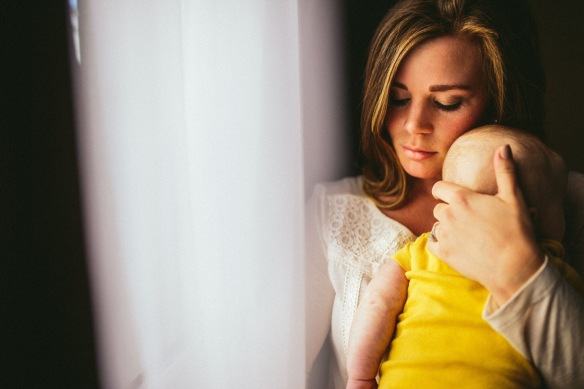We had a brilliant day, yesterday. The day after Boxing Day. The day of confusion, when no one quite knows what to do with themselves. The rush of Christmas is over, the stretching out of which, otherwise known as Boxing Day has been and gone and we’re all left scratching our heads, wondering what to do?
Well, it was an easy one for me. My Secret Santa (Mother-in-Law) was fab this year and brought me some stunning rainbow wellies! With my feet itching to get in them and dirty them up, there was only one thing for it. MUD PIES!!
So, I got the kids ready (Maya and her cousin, Sofia) and headed for the mud!
We’re currently down in Somerset, for the Christmas period, staying with my husband’s sister in their big farmhouse. They have so much land and it’s right in the middle of lots of lovely countryside. Perfect for mud pie making.
We headed down to the field, where I had earlier spotted a huge patch of grass-free, sloppy mud!
The first thing we did was get to know the mud. From experience, it’s never a good idea to jump into new sensory activities too soon, with modern day, domesticated little ones. Last time I did that, this happened..

As you can see, she was less than impressed with the homemade, organic, orange jelly-pool, I had spent all morning making for her, so that she could have a great sensory experience!
Lesson learnt.
Maya has spent many days outdoors and we’ve done baby-led weaning with her, in the knowledge that, with it, we would also be treating her to a bit of daily messy-play that would help to enhance her sensory development, amongst many other things. But what we haven’t had much of, is getting butt-naked and launching ourselves into pools of unknown textures. Babies and children are very sensitive to new sensory experiences and what can be a great learning curve, can also be just downright terrifying.
I realised I was keeping my small, domesticated human a little too wrapped up in the “comforts” of the home and not getting stuck into the outdoors as much as we should be. So, we’ve been spending a lot more time outside, lately, getting to know nature. Picking up sticks, stones, leaves, flowers etc… Many got eaten. Many were brought home and played with until there was no life left in them. And over time, Maya has got used to exploring the different objects and textures of the outdoors.
So, we were definitely ready for some mud play!
I was a little uncertain with how Sofia would react. As we don’t see eachother very often, and all children are so different, I was secretly crossing my fingers and toes that she would enjoy it and get stuck in. Well, she did! She loved it! Learning from history, I introduced them both slowly to the mud. Maya is going through a great stage of observation, especially where ‘big kids’ are involved. She learns so much from them and just loves to sit and watch them. So, along with some helpful supervision from Daddy, Maya was conveniently placed on the gravel, while Sofia and I took the plunge.
We began by taking steps in the mud. There was some big pools of water, so we chatted about how there was lots of mud but also lots of puddles of water in the mud. Then we challenged ourselves to find the puddles and splash in them. This went down a treat! Sofia loved splashing and sploshing and got mega excited with every puddle. We observed the sound the mud made when we squashed it with our feet and how our feet sometimes got stuck in the mud and it was difficult (and funny) to pull them out.
Once Sofia was acquainted with the mud, using large wooden spoons, we began filling our big bowl with the lovely stuff. This was fun. I felt like I was making a big sloppy chocolate pie (…wishful thinking). Sofia, thoroughly enjoyed the task. She could do it well.
At this point, I gave Maya a bowl of mud to play with and she sat, dipping her fingers in it. I dipped my fingers in and showed Sofia. She gasped, slightly horrified that I had intentionally dirtied my hands. I explained that it was ok, I meant to get my hands dirty and asked if she wanted to try it. It was a firm “no”. I explained that it was ok if she didn’t want to and we continued to fill the bowl with mud.


Next, we needed our pie to be a little bit firmer and less watery. So, we poured our mud into a collider and we watched how the water drained and separated from the mud. We then noticed how the mud was now nice and “hard” and less “sloppy”. Then we poured our mud back into the bowl. At this point, Sofia got some mud on her fingers. “Ooh, no!” She looked at me and showed me the mess. I smiled and said, “That’s OK. We’re making a mud pie. It’s ok to get your hands dirty when you make a mud pie.” She wasn’t sure. I took my own hands and demonstrated by grabbing the mud in the bowl, letting it run through my fingers and playing with it, which she found hilarious! But still, wasn’t ready to get her hands dirty. “That’s OK”, I smiled and we continued.
Sofia was sat stirring her mud pie, when I realised there was a wooden fence right next to us that would be great for painting on. So, I took to the fence.
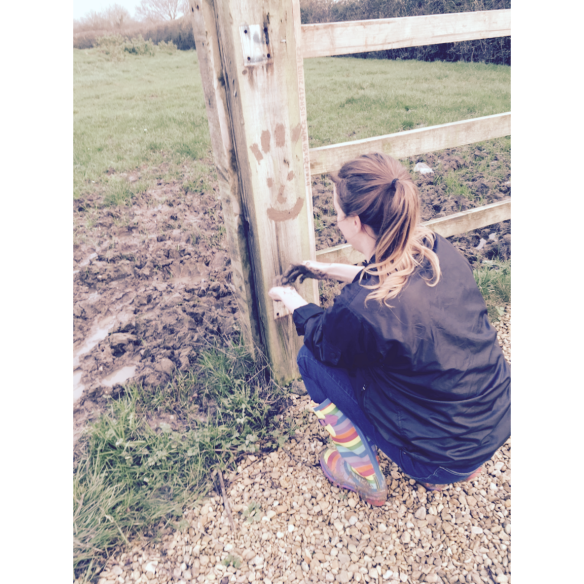
Sofia and Maya were both engaged with their mud pies, so I took it as an opportunity to allow them a bit of independent play and tried not to disturb them.
It didn’t take them long to realise I was doing something quite fun and they came to investigate. I showed them both how I was dipping my finger into the pile of mud in my other hand and using it to paint on the fence with. I asked Maya if she wanted some mud on her hands, to which she looked at me like I was crazy and shook her head. I laughed, “OK, Maya, no problem.” I turned to Sofia, who smiled sweetly and, also, shook her head. “No problem”. I continued to paint.
Sofia had been watching what I was doing and was getting really excited about it. She started brushing the fence with her finger, in an attempt to paint it too but noticed that there was no picture when she did it. I showed her again, how I was dipping my finger into the mud, first, which then allowed me to paint pictures. I started painting the alphabet, to demonstrate. She watched and we both recited the alphabet together, which was lots of fun. By the time I got to “Z”, she was ready to take the plunge!

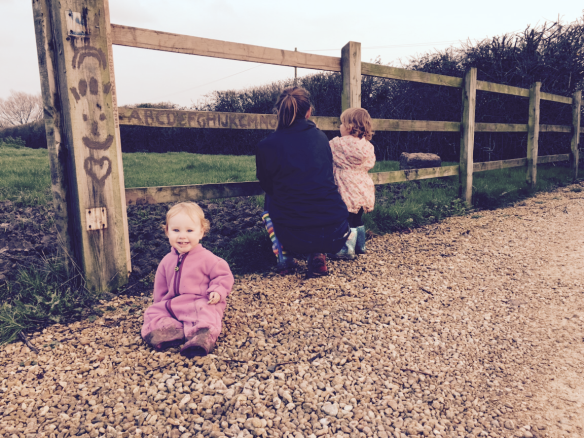
We began with some mud hand printing. I demonstrated first and Sofia copied. She got great pleasure from seeing the print form and ended up really enjoying getting her hands dirty!


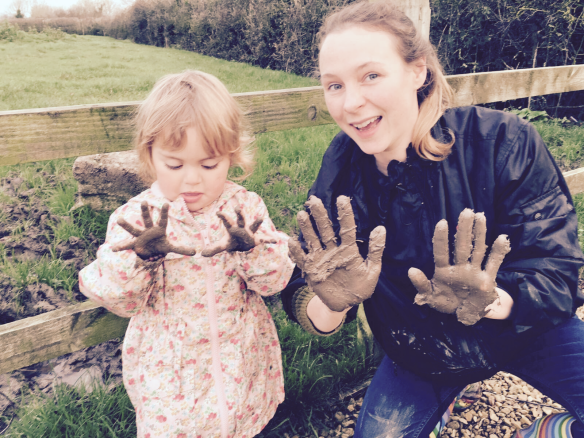
Shortly after, Sofia’s Mummy joined us and I got chance to escape to the field for a few minutes. There was a tree at the back of the field, which was full of black birds and I had been dying to investigate. I wondered why the birds had chosen that particular tree. What was so special about it? There was loads of others trees for them to perch on. What was so good about this one? As I got closer, I realised how loud the birds were churping. They were singing! Every single one of them and the sound was amazing! I got my phone out to record the sound and a minute later, they fell silent. Just at that, a huge cloud of them flew up into the air, from the neighbouring field, and soared right over my head. It was a wonderful sensory experience that I’ll never forget. I felt so at peace and free and apart of the natural world, something I haven’t felt for a long time. It reminded me of the days I used to feel like that, all the time, when I was a child and got me to thinking.
There’s been a huge trend in creating sensory experiences for our children, lately. Parents all over the world have been taking part in the new craze, that is, Messy Play! Tuft tray sales are soaring and supermarkets are cashing in on sales in their pasta and food colouring products, so that parents around the world may treat their children to things that excite their senses and enhance their development.
If there’s one thing I have taken from today, it is that maybe we don’t need to be so hasty with our purses and, equally, our time, planning these indoor sensory experiences. Maybe, all we need is to take a few steps from our homes, into the wonderful outdoors and let our children explore everything that Mother Nature has on offer. What better way to excite our children’s senses, whilst saving a few pennies and giving ourselves an opportunity to relax by getting out of planning all these spectacular activities.
Our original plan was simply to make mud pies. I didn’t know how we would make them or how it would evolve, I just collected a few kitchen bits and headed outside. We ended up learning a bit of science, art, English, construction and even some music when we sung the alphabet. The opportunities are endless! All it took was a bit of creativity and a lot of mud!
The day was finished off with a lovely co-bath for the girls and, for myself, a nice glass of red. It was so successful that I think, once we get home, I’ll make sure we get down and dirty outdoors at least once a week, from now on. There really is so much to learn. It’s relaxing, therapeutic, educational and it’s, quite literally, the best sensory experience on earth!
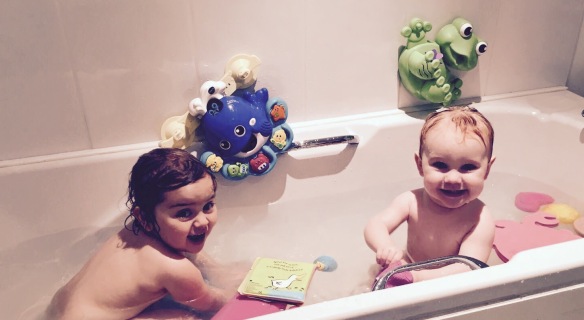
Connect with me on Facebook to stay updated on my posts!
51.396019
-2.857082


